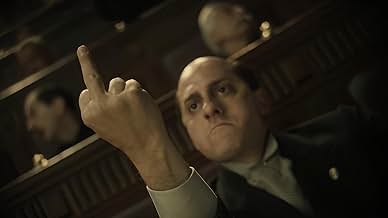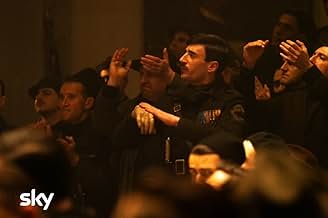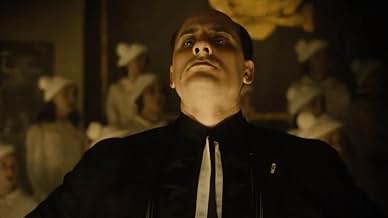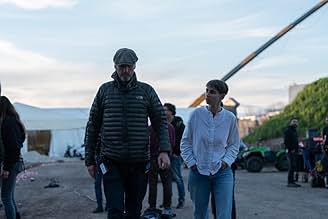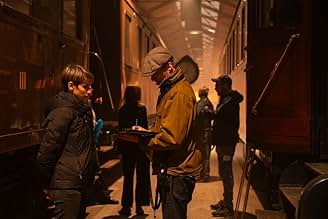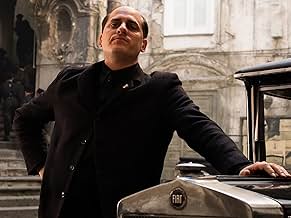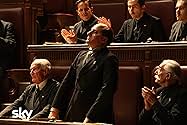Chronique de la montée en puissance du dictateur italien Benito Mussolini dans l'histoire d'un pays qui a cédé à la dictature.Chronique de la montée en puissance du dictateur italien Benito Mussolini dans l'histoire d'un pays qui a cédé à la dictature.Chronique de la montée en puissance du dictateur italien Benito Mussolini dans l'histoire d'un pays qui a cédé à la dictature.
- Récompenses
- 2 victoires au total
Parcourir les épisodes
Avis à la une
The film presents the beginnings of Benito Musollini's political career. But to a greater extent it is a study of the creation of a dictatorship. And this is a universal and timeless phenomenon.
What is unusual is the form, which may put off some viewers. The main character often speaks directly to the audience, presents his thoughts and comments on the events taking place, sometimes these allusions are current, e.g. In episode four when he says the slogan MIGA (you will understand when you see it). It is a really great scene.
The film is also quite baroque, at times surreal.
The acting makes a great impression. Luca Marinelli (Musollini) behaves on screen like his prototype. If you know the history and have seen Mussolini's grotesque speeches, you can imagine that this required great skills. Other roles, although episodic, are also worth attention. For example, Benedetta Cimatti is great as the suppressed wife of the Duce.
Due to the specific form of the film, some viewers may be put off by it.
But it's a very good movie.
What is unusual is the form, which may put off some viewers. The main character often speaks directly to the audience, presents his thoughts and comments on the events taking place, sometimes these allusions are current, e.g. In episode four when he says the slogan MIGA (you will understand when you see it). It is a really great scene.
The film is also quite baroque, at times surreal.
The acting makes a great impression. Luca Marinelli (Musollini) behaves on screen like his prototype. If you know the history and have seen Mussolini's grotesque speeches, you can imagine that this required great skills. Other roles, although episodic, are also worth attention. For example, Benedetta Cimatti is great as the suppressed wife of the Duce.
Due to the specific form of the film, some viewers may be put off by it.
But it's a very good movie.
Compelling plot, striking photography, excellent acting by Marinelli. Above all, a solid portrayal of a particular historical period.
Much more to be appreciated if you speak Italian, because Marinelli's performance is truly a masterpiece, both from a linguistic and human point of view. M is a winning example of how history should be represented in cinema: hard and raw, without unnecessary words or unnecessary events based on fiction.
I really recommend its viewing. However, do not expect a simple and straightforward viewing; the story is purely described, there is no shortage of harsh scenes and I felt like some stories missed some details.
What is interesting is that the meaning of some of the pictures goes beyond the simple political figure to the man, with his fears and weaknesses. Things that, of the figure of Mussolini, never really came out of that period.
Excellent cinematic work.
Much more to be appreciated if you speak Italian, because Marinelli's performance is truly a masterpiece, both from a linguistic and human point of view. M is a winning example of how history should be represented in cinema: hard and raw, without unnecessary words or unnecessary events based on fiction.
I really recommend its viewing. However, do not expect a simple and straightforward viewing; the story is purely described, there is no shortage of harsh scenes and I felt like some stories missed some details.
What is interesting is that the meaning of some of the pictures goes beyond the simple political figure to the man, with his fears and weaknesses. Things that, of the figure of Mussolini, never really came out of that period.
Excellent cinematic work.
Best Most Engrossing TV In Years.
I don't know how much of the Parliamentary madness is historically accurate, how much the birth of Fascism was accurate either, what I do know this series is giving me and anyone who takes the time to engage with the movement the phenomenon called Fascism build by a human being who cut out the representative instinct, the fundamental purpose of Legitimate Representation, the instruments that since the Athenian experiment was found to successfully create, control the masses. The tools to create a society.
Mussolini brought this idea into our world. The use of chaos into politics. That by changing your position, saying the insayable, thinking the unthinkable you can take control of millions of people.
Mussolini proposed to do the impossible and made people believe he had done it. He unbalanced his opponents. The whole body politic couldn't construct a coherent strategy to combat him.
Sensible, pragmatic policies are forgotten as those who think otherwise gasp for breath.
And Benito with his grasp of how the prolaterate thought. How he instructed them to believe "His Message". The truth was never considered. Benito was the 1st. All our modern demi gods use El Duce play book. No Hitler. No Franco. No Pinochet. No Pol Pot. No Saddam without Mussolini.
El Duce thought them all.
And we laugh at him. Maybe its us that are the fools.
Who'll be next to use his bag of tricks?
So now we have this magnificent expose of control by an English director an Italian writer and Rupert Murdochs Sky putting the money, the distribution, the lesson on how not to be a politician in front of us.
The "Making Of" might be a mini series for another day.
To think till now "Gomorrah" was the height of our appreciation for Italian modern story telling. And season 1 ends with Matteotti murder. What a rich vein of contemporary instruction lays before us.
By the way. This is Magnificent. A 10 all day long and double on Sunday.
I don't know how much of the Parliamentary madness is historically accurate, how much the birth of Fascism was accurate either, what I do know this series is giving me and anyone who takes the time to engage with the movement the phenomenon called Fascism build by a human being who cut out the representative instinct, the fundamental purpose of Legitimate Representation, the instruments that since the Athenian experiment was found to successfully create, control the masses. The tools to create a society.
Mussolini brought this idea into our world. The use of chaos into politics. That by changing your position, saying the insayable, thinking the unthinkable you can take control of millions of people.
Mussolini proposed to do the impossible and made people believe he had done it. He unbalanced his opponents. The whole body politic couldn't construct a coherent strategy to combat him.
Sensible, pragmatic policies are forgotten as those who think otherwise gasp for breath.
And Benito with his grasp of how the prolaterate thought. How he instructed them to believe "His Message". The truth was never considered. Benito was the 1st. All our modern demi gods use El Duce play book. No Hitler. No Franco. No Pinochet. No Pol Pot. No Saddam without Mussolini.
El Duce thought them all.
And we laugh at him. Maybe its us that are the fools.
Who'll be next to use his bag of tricks?
So now we have this magnificent expose of control by an English director an Italian writer and Rupert Murdochs Sky putting the money, the distribution, the lesson on how not to be a politician in front of us.
The "Making Of" might be a mini series for another day.
To think till now "Gomorrah" was the height of our appreciation for Italian modern story telling. And season 1 ends with Matteotti murder. What a rich vein of contemporary instruction lays before us.
By the way. This is Magnificent. A 10 all day long and double on Sunday.
The english subtitles are a disaster. They look like automated translations not reviewed by someone who understand italian. For example "Margarita" (the name of a woman) is translated as "margarita pizza". Or "No, no" is translated "ninth", because in italian "nono" means "ninth".
Sometimes these bugs don't help comprehension. They mix up pronouns: "They kick it out" instead of "They kick him out". They don't take into account the formal you that in italian is she. For some complex sentences there is no analysis done by a human : "his husband".
An amateur job done by incompetents.
Such a magnificent work deserves better.
Sometimes these bugs don't help comprehension. They mix up pronouns: "They kick it out" instead of "They kick him out". They don't take into account the formal you that in italian is she. For some complex sentences there is no analysis done by a human : "his husband".
An amateur job done by incompetents.
Such a magnificent work deserves better.
By now it is evident that in the Post-network era and when from the zenith the third Golden Age of Television began its inevitable downward parabola no one, including myself, would have expected such a product... especially an Italian one.
M the son of the century is the classic turn of the century, the breaktrough event or, if you like a film allegory better: it is the hero we need but do not deserve. The future of Our television, it is clear, blatant and unashamed that it will be defined by the 'Before M' and the 'After M'.
Beautiful, beautiful series. Monumental every performance. Ficcanti every dialogue. Generative storytelling from history and brought up to date, without ever becoming exhibitionist. A series one step away from hybris without ever crossing the thin line and, because of this, incredibly verisimilitude in its (deliberate) staging between the theatrical and magical realism.
A possible event, because there is a thick book behind it, not only of volume but also of historical research... but also (oh my God, finally!!!) an adequate budget. It matters little that some images are realistically dated in the staging. It doesn't matter. You want the real date? There's the book but in this instalment it was perfectly there.
A futurist Zang Tumb Tumb series like we've needed for a long time. Because, just like futurism, the last true and pure current of thought and artistic movement that since the publication of its manifesto in 1909 has not found to date a worthy new cultural vision that can be described as truly original and not a rinsing of dishes from other shores. This is M. The first of something else in the making that, los peri pernos, will be even more surprising and innovative.
Zang Tumb Tumb.
M the son of the century is the classic turn of the century, the breaktrough event or, if you like a film allegory better: it is the hero we need but do not deserve. The future of Our television, it is clear, blatant and unashamed that it will be defined by the 'Before M' and the 'After M'.
Beautiful, beautiful series. Monumental every performance. Ficcanti every dialogue. Generative storytelling from history and brought up to date, without ever becoming exhibitionist. A series one step away from hybris without ever crossing the thin line and, because of this, incredibly verisimilitude in its (deliberate) staging between the theatrical and magical realism.
A possible event, because there is a thick book behind it, not only of volume but also of historical research... but also (oh my God, finally!!!) an adequate budget. It matters little that some images are realistically dated in the staging. It doesn't matter. You want the real date? There's the book but in this instalment it was perfectly there.
A futurist Zang Tumb Tumb series like we've needed for a long time. Because, just like futurism, the last true and pure current of thought and artistic movement that since the publication of its manifesto in 1909 has not found to date a worthy new cultural vision that can be described as truly original and not a rinsing of dishes from other shores. This is M. The first of something else in the making that, los peri pernos, will be even more surprising and innovative.
Zang Tumb Tumb.
Le saviez-vous
- AnecdotesWhen Joe Wright got on board as director, at first he meant to have the actors say their lines in English. Then he changed his mind and chose to shoot the series in Italian, for a higher immediacy.
Meilleurs choix
Connectez-vous pour évaluer et suivre la liste de favoris afin de recevoir des recommandations personnalisées
- How many episodes will Mussolini: Son of the Century have?Alimenté par Alexa
Détails
- Date de sortie
- Pays d’origine
- Site officiel
- Langue
- Aussi connu sous le nom de
- Mussolini: Son of the Century
- Lieux de tournage
- Sociétés de production
- Voir plus de crédits d'entreprise sur IMDbPro
- Durée
- 52min
- Couleur
Contribuer à cette page
Suggérer une modification ou ajouter du contenu manquant

![Regarder Trailer Season 1 [OV]](https://m.media-amazon.com/images/M/MV5BYWM4MjYyMDktOWQwNy00NzNlLTg0OGUtZjk5Yzk0MjA2YmNlXkEyXkFqcGdeQXRyYW5zY29kZS13b3JrZmxvdw@@._V1_QL75_UX500_CR0)
